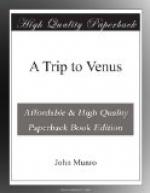It was answered by a young woman, in a plain gown of some dark stuff, with a white collar round the neck. In spite of her dress I could see that she was not an ordinary cottage girl. Pretty, without being beautiful, there was a distinction in her voice and manner which bespoke the gentlewoman. With a pleasant smile, she welcomed me as one who had been expected, and ushered me into a small sitting-room, poorly furnished, but with a taste and refinement unusual in a workman’s home. A large piano stood in one of the corners, and a pile of classical music lay on a chair beside it. The mantelpiece was decorated with cut flowers, and the walls were hung with portraits and sketches in crayons and water-colour.
“My father will be down in a moment,” she said, with a slight American accent. “He is delighted to have the pleasure of meeting you. It is so kind of you to come.”
Before I had time to respond, Mr. Carmichael entered the parlour. He was a man of striking and venerable presence. His long white locks, his bulging brow, pregnant with brain, his bushy eyebrows and deep blue-grey eyes, his aquiline nose and flowing beard, gave an Olympian cast to his noble head. Withal, I could not help noticing that his countenance was lined with care, his black coat seamed and threadbare, his hands rough and horny, like those of a workman. If he appeared a god, it was a god in exile or disgrace; a Saturn rather than a Jove.
“Now to the matter,” said he, after a few words of kindly welcome. “Evidently the question of inter-planetary travel is coming to the front. In your article you suggest that a locomotive car, that is to say, a car able to propel itself through what we, in our ignorance, call empty space, though, in reality, it is chock-full, and very ‘thrang’ as the Scotch say, might yet be contrived, and even worked by energy drawn from the ether direct. When I read that, sir, I sat up and rubbed my eyes.”
“Your spectacles, father,” said Miss Carmichael.
“Well, it’s the same thing,” went on the old man. “For like many another prophet, sir, you had prophesied better than you knew.”
“How do you mean?” I inquired, with a puzzled air.
“If you will step with me into the garden I will show you.”
I rose and followed him into a large shed, which was fitted up as a workshop and laboratory. It contained several large benches, provided with turning lathes and tools, a quantity of chemicals, and scientific apparatus.
“I am going to do a thing that I have never done in my life before,” said Mr. Carmichael, in a sad and doubtful tone; “I have kept this secret so long that it seems like parting with myself to disclose it, to disclose even the existence of it. I have fed upon it as a young man feeds on love. It has been my nourishment, my manna in the wilderness of this world, my solace under a thousand trials, my inspiration from on High. I verily believe it has kept my old carcase together. Mind!” he added, with a penetrating glance of his grey eyes, which gleamed under their bushy brows like a pool of water in a cavern overhung with brambles, “promise me that whatever you see and hear will remain a secret on your part. Never breathe a word of it to a living soul. You are the only person, except my own daughter, whom I have ever taken into my confidence.”




